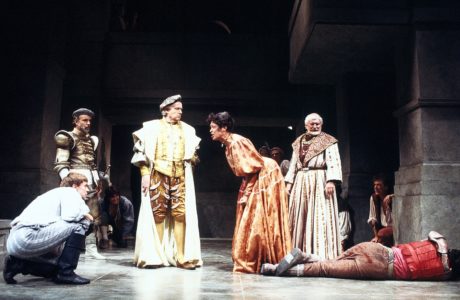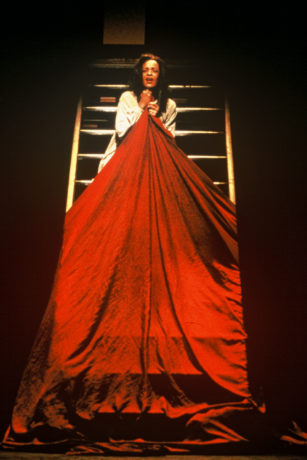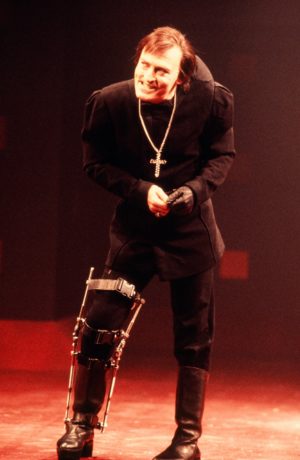“I think you have to define who you are–and that definition can change–but you have to be as uncompromising as you possibly can about who you think you are, and to fight for that, in bad times and good times.”–Michael Kahn, Art Talk, 2012
As we approach the conclusion of Shakespeare Theatre Company’s Artistic Director Michael Kahn’s Grand Finale season, there will be many celebrations of his historic contribution to the theatre, whether here in DC, nationally, or internationally. The Shakespeare Theatre at the Folger Shakespeare Library was about to close when Kahn took over as Artistic Director in 1986. At that time, Kahn was chairman of the acting department at the Juilliard School in New York, and was in rehearsal with the Acting Company. He was replacing John Neville-Andrews, who had resigned.

Under Kahn’s leadership, now christened the Shakespeare Theatre Company, STC has become internationally recognized as a premier classical theatre. In 2012, STC received the Regional Theatre Tony Award. It has not only produced many successful Shakespeare plays, but also other classics by a wide range of authors, from Euripides to Harold Pinter. Recent productions include Hamlet starring Michael Urie and directed by Kahn, an acclaimed adaptation of Molière, The School for Lies, by David Ives, and hit musicals, such as Kiss Me Kate and Camelot, directed by Alan Paul. Hamlet, with Michael Urie, will return for the STC Free For All at Sidney Harman Hall July 10-21.
In relocating the company from the smaller Folger Shakespeare Library to the 451-seat Lansburgh Theatre and the 774-seat Harman Hall, Kahn invigorated and enlarged the District’s theatre community, attracting stars such as Kelly McGillis, Stacy Keach and Patrick Stewart. The standard of excellence he has maintained, culminating in the soon-to-open The Oresteia (April 30-June 2) directed by Kahn, will doubtless continue under Simon Godwin, the incoming Artistic Director.
In a 1986 interview with David Richards in The Washington Post, Kahn commented:
“I think I’m fairly rigorous in my investigation of text and character. I’ve never been one who thought, ‘Wouldn’t it be fun to do this play in the style of the H.M.S. Pinafore.’ I suppose there’s nothing wrong with setting ‘Romeo and Juliet’ in a circus, if you think that the circus truly illuminates ‘Romeo and Juliet.’ But I’m not big on leafing through art books and choosing an attractive period. That’s just decor and theatrics for their own sake.
“By the same token, I can’t say we’ll be doing all the plays traditionally. Most people’s idea of traditional Shakespeare is merely what they saw when they were kids. If I do a particular play, it’s because there’s a reason to do that play, because it truly speaks to me or because there are specific actors who would be marvelous in it.” Kahn has given opportunities to many of DC’s most beloved and talented performers, such as Floyd King (returning for a future Michael Kahn and Friends: Off the Record event on May 15), Ted van Griethuysen, Nancy Robinette, Craig Wallace, and Tom Story.
Kahn introduced Free For All, a free Shakespeare production à la Shakespeare in the Park in New York, which has become a Washington tradition. A one-year MFA program, the Academy for Classical Acting, another significant contribution, enhances STC’s reputation as a leader in artistic education.

In Michael Kahn and Friends: Off the Record, we had the privilege of listening to Michael Kahn, actors Edward Gero, Stacy Keach, Franchelle Stewart Dorn, Derek Smith (by video) and director Daniel Fish (by video) as they discussed Kahn’s early years at the Folger. There were many tales of artistic triumph, as well as some anecdotes of how-I-forgot-my-lines, used a Scottish accent, or almost succumbed to the giggles onstage. The presentation, which sparkled with affection and good humor, was supplemented with vivid pictures of Folger performances.
Kahn described his arrival with his signature wit. He found an apartment near the Kennedy Center–then he discovered it was nowhere near the theatre. At a welcoming party, he was introduced as “Michael Caine.”
Romeo and Juliet (1986) was directed by Kahn, with Juilliard graduates Laura Hicks and Derek Smith. It featured well-known comedienne Pat Carroll as the Nurse. Smith recounted a classic stage mishap. He was in the dressing room, minding his own business, listening to the show piped in through the speaker. Then he heard that most ominous of sounds, a long, deadly silence. He was thinking “I feel so badly for whoever forgot their lines.” Then he heard (famous last words). “I’m sure Romeo will be here soon.” Needless to say, he rushed upstairs. It must have been one of those incidents which is amusing now, but terrifying at the time! Pat Carroll won a Helen Hayes Award that year for her portrayal of the Nurse.

There is a lovely photo of Fran Dorn as Lady Macbeth in the Scottish play (1988), spreading out a beautiful length of red velvet. In rehearsal, Kahn had an inspiration. As she pulled it up with her hands, he suggested: “Turn it into a baby.” Dorn remembers Kahn commenting, enigmatically, “I don’t believe in witches. But I believe in people who BELIEVE they are witches.” These witches were ubiquitous, appearing even in the Macbeth household. This is similar to the Chorus’s role in the upcoming The Oresteia. Edward Gero received a Helen Hayes Award for his performance as Macduff in this Macbeth.
Antony and Cleopatra (1988-89) was already on the schedule when Kahn was asked to direct it. Anyone who has ever read or seen Shakespeare’s Antony and Cleopatra knows what a sprawling epic it is. It is no easy task to perform it in an intimate setting like the Folger. (Not to mention the columns!). Undeterred, Kahn met the challenge, casting Franchelle Stewart Dorn as Cleopatra and Kenneth Haigh as Antony. The design featured a raked stage. This would have worked, except that there was a sort of stream involved. The water flowed down the stage directly into the audience, dousing the first row. “We’ll get Egyptian boys with blue towels,” Kahn announced. The boys obediently toweled off the water, and another production was saved.
It was intriguing to hear Stacy Keach talk about his groundbreaking Richard III (1990). By this time, Kahn had initiated the tradition of Open Rehearsals, in which an audience is invited to watch the cast rehearse. This has since become a popular industry phenomenon. There will be a new Open Rehearsal for The Oresteia on Sunday, April 21. For Keach’s Richard III Open Rehearsal, the line stretched all the way around the block.

One of the most insightful aspects of Keach’s portrayal was his use of a leg brace as Richard’s disability. When Richard becomes king, the leg brace becomes less necessary. On Bosworth Field, it transforms into a weapon. Keach noted, on the subject of Richard, “I understood his resentment. I understood that he enjoyed killing people.” Looking at the picture of Keach’s Richard, there is no doubt that he is indeed having a fine time. Although it is not very noticeable, he is also sporting a false nose: he was happy to report that it was originally Brian Bedford’s nose as Shylock in The Merchant of Venice.
Occasionally, Kahn was considered somewhat–how should I say this?–temperamental. In fact, cast members believed he had an alternate personality called “Skippy” who frightened the actors. “Anyone who behaved now as I did then,” he says, “would not work.” However, today he is lauded for his respectful and encouraging treatment of actors and non-actors alike. And, he adds, “I wasn’t behaving any differently with you than I did with my own mother.”
“My mother was a Russian immigrant,” he says, “and she read Shakespeare to me every night. She didn’t think any of it was sexy, so she never took anything out. She read the Bible too, but in that case, she skipped the sexy parts.”
Director Daniel Fish, whose Oklahoma! opened April 7 on Broadway, appeared on video to honor his work with Kahn. This Oklahoma! has been praised as a seminal production which will change the way we view the musical forever. Fish directed The Merry Wives of Windsor at the Lansburgh Theatre in 1998.
Kahn and his Board began planning the redevelopment of the Lansburgh Theatre while Marion Barry was Mayor and completed it when Sharon Pratt Dixon was Mayor. The decision to move to the Lansburgh revitalized the languishing Penn Quarter, and turned it into the thriving neighborhood it is today.
Future Michael Kahn and Friends events will focus on the Lansburgh Years (May 15) and the Harman Years (June 3). They promise to be seriously entertaining. A theatrical version of MSNBC’s Morning Joe, these evenings will be must-see occasions for DC theatre lovers.
Michael Kahn and Friends: Off the Record events will be held May 15 and June 3 at Shakespeare Theatre Company’s Sidney Harman Hall, 610 F Street NW, Washington, DC. For tickets, call (202) 547-1122, or go online.




